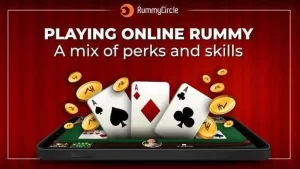Examining your opponents’ card discards and picks can be an effective strategy in online rummy. By noting patterns, you can identify whether they are trying to form sequences or runs; then by holding onto cards which prevent their completion and reduce points if they declare.
Rules
Rummy is a game of probability and skills, so mastering the art of bluffing can significantly elevate your gameplay and make you an intimidating opponent. Understanding the rules, employing key techniques and reading opponents are key components to being an effective bluffer – as is striking a balance between bluffing and honest gameplay.
Effective card grouping is a key element of online rummy bluffing and can help improve your gameplay. For instance, if an opponent consistently discards cards of one rank over others, you could deduce that they’re trying to complete a sequence and thus potentially improve your own game.
An effective bluff can disrupt your opponent’s plans and increase your odds of victory, but be wary of overusing this tactic as this could compromise the value of your strategy.
Variations
Bluffing can be a difficult skill to master in Rummy. It requires carefully strategizing and watching for moves of opponents to avoid surprising them by surprise, using misdirection to cause uncertainty and create chaos that will force errors that you can capitalize upon.
Watching how your opponents group and discard cards can provide invaluable insight into their strategies. For instance, if an opponent consistently discards high-value cards, this may indicate they’re trying to form a set or run. When this occurs, you could bluff by discarding one of similar rank as well – effectively stopping their sequence!
Mix real discards with bluffs and be wary about revealing any of your melds; this strategy can increase your odds of victory in any poker game.
Betting intervals
Bluffing is an integral component of cash rummy, requiring strategic thinking and an awareness of opponent behavior as well as an understanding of psychology and emotion reading to successfully execute. Done properly, this strategy can bring great gains.
An effective strategy in bluffing involves keeping an eye on your opponent’s playing style and card selection/discard habits to understand their ranges and plan appropriately. But you must be wary not to bluff too early or too late, which could result in losses for both of you.
Another key element of successful rummy bluffs is keeping track of which cards have been discarded, so as to select those worth keeping and which are worth discarding without negatively affecting the odds of victory for opponents.
Detection strategies
To effectively use bluffing in rummy, it is key to remain attentive and analyze your opponents. Pay attention to their discards and picks, and adjust your strategy accordingly. Furthermore, be wary of your bluffing frequency; too often will lead to your opponents becoming warier of you and potentially more cautious against future attempts at bluffing.
One of the most effective bluffing strategies is strategically discarding cards your opponents need for their melds, to mislead them into thinking you don’t care about sets or runs of high value, forcing them to discard valuable cards from either the draw pile or their own discards – giving the bluffer control of their opponents’ decision-making, creating an advantage in the game; though such strategies cannot always go undetected by more skilled opponents.
Misdirection
Mastering bluffing in rummy is a key component of gameplay and can propel your game to new levels. By understanding its rules, employing key techniques, and reading your opponents’ moves effectively, bluffing can become an intimidating player. But be wary as bluffing can involve deception and uncertainty which comes with risks; therefore it is crucial that before making such decisions in cash rummy games it be assessed thoroughly for both potential risks as well as possible repercussions.
As your opponents will quickly recognize your bluffing strategy, mixing real discards with some deceptive bluffs may help fool them. By monitoring the discard pile closely, you can learn what cards your opponents are seeking out and find ways to disrupt their plans.




